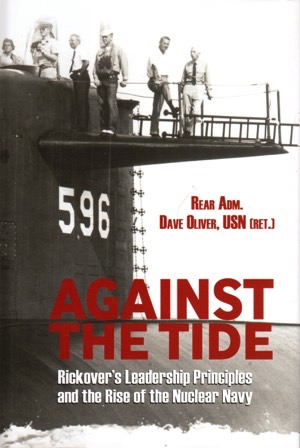
Against the Tide: Rickover’s Leadership Principles and the Rise of the Nuclear Navy. By Rear Admiral Dave Oliver, USN (Ret.). Published by the Naval Institute Press, Annapolis MD, 2014.
Reviewed by Dr Gregory P. Gilbert
ONE MUST create the ability in this staff to generate clear forceful arguments for opposing viewpoints as well as for their own. Open discussions and disagreements must be encouraged.
— Admiral Hyman G. Rickover, USN
This fascinating, easy to read, and engaging book is hard to put down. I found it particularly pleasing as it prompted me to reflect upon my own personal experiences, even though I have never been a nuclear submariner.
Against the Tide is a highly enjoyable read. Admiral Dan Oliver uses crisp language, personal anecdotes and provocative questions to put forward the leadership principles of Admiral Rickover, the father of the USA’s nuclear navy. Rickover was one of the United States Navy’s most controversial but overwhelmingly successful managers. Until now his management philosophy and leadership ethos has remained largely unknown. The book is short and sharp but, like Rickover’s words and deeds, is straight to the point.
With just 137 pages Against the Tide does not take long to read but it is packed full of useful material. For example the main ideas of Rickover’s 1954 speech to the Naval Postgraduate School (reproduced at Note 10 on p. 159) are a masterly succinct, relevant and very useful guide for managing people. Many of these ideas are now truisms although few are acted upon.
The author’s professional development and life experiences provide excellent case studies for Rickover’s leadership principles. His anecdotes are candid, forthright and memorable. Although the difficulties of cultural change within organisations such as the United States Navy are discussed, one of the book’s major achievements is that it is itself a catalyst for cultural change.
Those, like myself, who have experienced the Royal Australian Navy’s own attempts to manage its way through cultural changes – NQM, CSP, NGN and the like – will be well supplied with their own parallel anecdotes. One should consider whether the RAN’s recent methodologies have tended to replicate Admiral Elmo R Zumwalt’s mostly unsuccessful methods of implementing cultural change and ignored the alternative Rickover approach (see Chapter 12 for USN experience).
Oliver believes that Rickover’s leadership and management techniques could aid any manager, and that although his principles were there for all to see they tended to be lost in the astonishing story of his career. It is also interesting that Oliver states that there is residual resentment in the Navy and the defence industry revolving around the cultural changes forced by Rickover.
Throughout much of the book Rickover is idolized; however, Against the Tide also identifies flaws in Rickover’s personality. He was an introvert who did not get on well with others socially and he lacked command presence. Although he commanded a mine warfare vessel for a short period, Rickover never commanded a major war vessel, submarine or exercised an operational command. He gained fame as an extraordinary engineer and manager.
As with most things Rickover’s methods should not be treated as a checklist for successful management. In some ways his methods are too black and white, perhaps due to the very nature of nuclear engineering, however Rickover has much to offer. The success of his approach during the introduction of nuclear power to the USN reveals significant contradictions in many of the modern approaches to leadership and management.
Against the Tide is well named. It reveals an astonishing alternative leadership approach that continues to instil a successful management culture within the USN’s nuclear powered submarine forces to this very day. However, outside the submarine community such management methods are considered against the tide of common practice.
Against the Tide is highly recommended for anyone wishing to better understand our modern era of continuous cultural evolution and is looking for alternatives.



